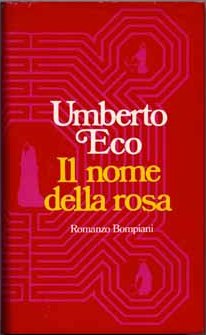The Name of the Rose

The Name of the Rose (Italian: Il nome della rosa [il ˈnoːme della ˈrɔːza]) is the 1980 debut novel by Italian author Umberto Eco. It is a historical murder mystery set in an Italian monastery in the year 1327, and an intellectual mystery combining semiotics in fiction, biblical analysis, medieval studies, and literary theory. It was translated into English by William Weaver in 1983.
The novel has sold over 50 million copies worldwide, becoming one of the best-selling books ever published.[1] It has received many international awards and accolades, such as the Strega Prize in 1981 and Prix Medicis Étranger in 1982, and was ranked 14th on Le Monde’s 100 Books of the Century list.
In 1327, Franciscan friar William of Baskerville and Adso of Melk, a Benedictine novice travelling under his protection, arrive at a Benedictine monastery in Northern Italy to attend a theological disputation. This abbey is being used as neutral ground in a dispute between Pope John XXII and the Franciscans, who are suspected of heresy.
The monastery is disturbed by the death of Adelmo of Otranto, an illuminator revered for his illustrations. Adelmo was skilled at comical artwork, especially concerning religious matters. William is asked by the monastery’s abbot, Abo of Fossanova, to investigate the death: During his enquiry he has a debate with one of the oldest monks in the abbey, Jorge of Burgos, about the theological meaning of laughter, which Jorge despises.
The next day, a scholar of Aristotle and translator of Greek and Arabic, Venantius of Salvemec, is found dead in a vat of pig’s blood. Severinus of Sankt Wendel, the herbalist, tells William that Venantius’s body had black stains on the tongue and fingers, which suggests poison. Benno of Uppsala, a rhetoric scholar, reveals to William that the librarian, Malachi of Hildesheim, and his assistant Berengar of Arundel, had a homosexual relationship, until Berengar seduced Adelmo, who committed suicide out of conflicting religious shame. The only other monks who knew about the indiscretions were Jorge and Venantius. In spite of Malachi prohibiting William and Adso from entering the labyrinthine library, they penetrate the labyrinth, discovering that there must be a hidden room, entitled the finis Africae after the presumed geographical edge of the world. They find a book on Venantius’ desk along with some cryptic notes. Someone snatches the book, and they pursue to no avail.
By the day after, Berengar has gone missing, which puts pressure on William. William learns of how Salvatore of Montferrat, and Remigio of Varagine, two cellarer monks, had a history with the Dulcinian heretics. Adso returns to the library alone in the evening. When leaving the library through the kitchen, Adso is seduced by a peasant girl, with whom he has his first sexual experience. After confessing to William, Adso is absolved, although he still feels guilty.
On the fourth day, Berengar is found drowned in a bath, although his body bears stains similar to Venantius’. Bernard Gui, a member of the Inquisition, arrives to search for the murderer via papal decree. Gui arrests the peasant girl Adso loved, as well as Salvatore, accusing them both of heresy and witchcraft.
During the theological disputation the next day, Severinus, after obtaining a “strange” book, is found dead in his laboratory, prompting William and Adso to search unsuccessfully for it. Remigio is interrogated by Gui, who scares him into revealing his heretical past, as well as falsely confessing to the crimes of the Abbey under threat of torture. In response to the recent tragedies in the abbey, Jorge leads a sermon about the coming of the Antichrist.
Malachi, near death, returns to the early sermon on the sixth day, and his final words concern scorpions. Nicholas of Morimondo, the glazier, tells William that whoever is the librarian would then become the Abbot, and with new light, William goes to the library to search for evidence. The Abbot is distraught that William has not solved the crime, and that the Inquisition is undermining him, so he dismisses William. That night, William and Adso penetrate the library once more and enters the finis Africae by solving its etymological riddle by chance.
